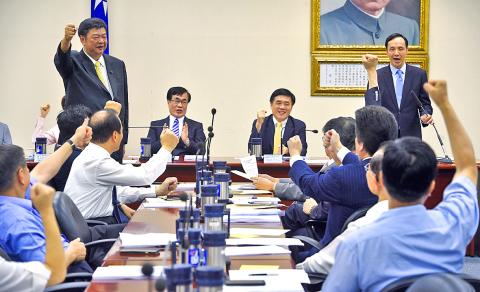A recent spate of Chinese Nationalist Party (KMT) members quitting or planning to leave the party was interpreted by KMT Chairman Eric Chu (朱立倫) yesterday as moves “to pursue individual political interests” following rifts linked to legislative candidate nominations.
Chu made the remarks during a speech at the start of the party’s weekly Central Standing Committee meeting.
A number of party members have quit or turned down nominations because they disagree with the way the party nominated candidates in some legislative constituencies, Chu said.

Photo: George Tsorng, Taipei Times
Chen said he had no problem with KMT members denouncing him or any specific policy, but added that they should not vilify the KMT, because it belongs to everyone, including Republic of China (ROC) founding father Sun Yat-sen (孫逸仙), former president Chiang Ching-kuo (蔣經國) and its 880,000 members, and has a century-old history.
“The KMT has stood firm on its sound fundamental policies and central ideals. You can jump to another boat in pursuit of individual political interests, but please do not vilify the KMT,” Chu said.
Since the KMT’s drubbing in the nine-in-one elections on Nov. 29 last year, several KMT lawmakers have chosen against seeking re-election in January’s legislative elections, while others quit to join the People First Party, rejected the party’s nomination, or considered dropping out of the party.
Opposition lawmakers have said that KMT lawmakers are jumping a sinking KMT ship en masse, which they said was prompted by the pro-unification cross-strait proposals made by the party’s presumptive presidential candidate, Deputy Legislative Speaker Hung Hsiu-chu (洪秀柱).
Hung’s nomination is expected to be confirmed at the party’s national congress on July 19.
During his speech, Chu said he has spoken with Hung about her cross-strait proposals that have raised concerns, adding that she has promised him that her policy would be enacted in compliance with the party’s policy platform.
The KMT’s cross-strait policy is based on the so-called “1992 consensus,” under which both sides agree to “one China” with each side having its own interpretation of what “China” means, and is aimed at ensuring the peaceful development of cross-strait relations and to advocate cross-strait cooperation to create a win-win situation, Chu said.
“It is part of our party platform and thus our policy, which all members nominated by the party should abide by and jointly make feasible,” he said.
Opposition parties say the “1992 consensus” does not exist. A former KMT lawmaker admitted in 2006 to making up the term in 2000.
Hung has previously proposed the “one China, different interpretations” formula be replaced with “one China, same interpretation.”
Meanwhile, independent Legislator Chen Hsueh-sheng (陳雪生) from Lienchiang County, Lienchiang County Council Speaker Chang Yuan-chiang (張永江) and Lienchiang County Councilor Tsao Cheng-chun (曹丞君) were at the KMT meeting, during which Chu welcomed them into the party.
“We are grateful that they joined the party during its most difficult time,” Chu said, adding that next week the party would unveil nominations of several young turks to represent the KMT in running for legislative seats.

CHAOS: Iranians took to the streets playing celebratory music after reports of Khamenei’s death on Saturday, while mourners also gathered in Tehran yesterday Iranian Supreme Leader Ayatollah Ali Khamenei was killed in a major attack on Iran launched by Israel and the US, throwing the future of the Islamic republic into doubt and raising the risk of regional instability. Iranian state television and the state-run IRNA news agency announced the 86-year-old’s death early yesterday. US President Donald Trump said it gave Iranians their “greatest chance” to “take back” their country. The announcements came after a joint US and Israeli aerial bombardment that targeted Iranian military and governmental sites. Trump said the “heavy and pinpoint bombing” would continue through the week or as long

TRUST: The KMT said it respected the US’ timing and considerations, and hoped it would continue to honor its commitments to helping Taiwan bolster its defenses and deterrence US President Donald Trump is delaying a multibillion-dollar arms sale to Taiwan to ensure his visit to Beijing is successful, a New York Times report said. The weapons sales package has stalled in the US Department of State, the report said, citing US officials it did not identify. The White House has told agencies not to push forward ahead of Trump’s meeting with Chinese President Xi Jinping (習近平), it said. The two last month held a phone call to discuss trade and geopolitical flashpoints ahead of the summit. Xi raised the Taiwan issue and urged the US to handle arms sales to

State-run CPC Corp, Taiwan (CPC, 台灣中油) yesterday said that it had confirmed on Saturday night with its liquefied natural gas (LNG) and crude oil suppliers that shipments are proceeding as scheduled and that domestic supplies remain unaffected. The CPC yesterday announced the gasoline and diesel prices will rise by NT$0.2 and NT$0.4 per liter, respectively, starting Monday, citing Middle East tensions and blizzards in the eastern United States. CPC also iterated it has been reducing the proportion of crude oil imports from the Middle East and diversifying its supply sources in the past few years in response to geopolitical risks, expanding

Pro-democracy media tycoon Jimmy Lai’s (黎智英) fraud conviction and prison sentence were yesterday overturned by a Hong Kong court, in a surprise legal decision that comes soon after Lai was jailed for 20 years on a separate national security charge. Judges Jeremy Poon (潘兆初), Anthea Pang (彭寶琴) and Derek Pang (彭偉昌) said in the judgement that they allowed the appeal from Lai, and another defendant in the case, to proceed, as a lower court judge had “erred.” “The Court of Appeal gave them leave to appeal against their conviction, allowed their appeals, quashed the convictions and set aside the sentences,” the judges